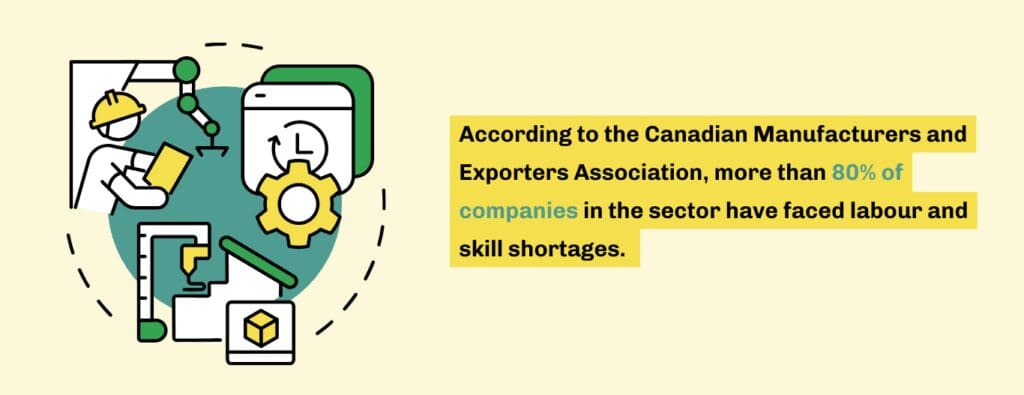Getting to grips with advanced manufacturing
It’s no secret that the nature of manufacturing in this country and around the world has been changing, and it’s not hard to understand why. New trends and pressures are transforming everything, from the kinds of things being made to the processes and systems used to make them. As we’ve said before at Palette Skills, there are many reasons why this is happening so quickly. Whether it’s the rise of the digital economy, developments in materials technology, or the drive towards net-zero, the sophistication and scope of advanced manufacturing is unlike anything you’ve seen before.
Traditional manufacturing—the kind many Canadians are used to—took simple raw materials and turned them into a lot of the things we depend on. Sheet metal, heavy equipment, durable goods like refrigerators–pretty much all the ‘stuff’ in our lives is the result of some kind of manufacturing. In this article, we will explore the growth of advanced manufacturing—often called industry 4.0—and see what challenges and opportunities there are for Canadian workers and employers in this high-tech industrial revolution.
What’s so advanced about advanced manufacturing?
To better understand the implications of advanced manufacturing in Canada, Palette Skills commissioned the international professional services and accounting firm Deloitte to analyze the state of advanced manufacturing—as well as five other high-growth sectors. The Upskilling for Industry Initiative report by Palette Skills and Deloitte emphasizes that industries in the advanced manufacturing sector invest significantly in R&D and science, technology, and sophisticated engineering. These firms also employ a large number of STEM workers to help deliver high tech solutions.
In a nutshell, the fourth industrial revolution combines everything from the digital and knowledge economy with advances in robotics, AI, and even biological science. Advanced manufacturers focus on things like automation, interconnectivity, machine learning, and the analysis of real time data. Technologies such as the Industrial Internet of Things (IIoT) and cloud computing also play a role.
Advanced manufacturing in Canada
Unfortunately, the Canadian manufacturing sector lags behind when it comes to productivity, a challenge shared by other parts of the economy, but made more complicated by uneven technology adoption in the sector. To remain competitive at a global scale, firms need to invest in new technology, fund research, and invest in the kind of skilled people who can help the sector adapt and thrive. It’s important, because as the Palette-Deloitte report points out, the benefits flowing from advanced manufacturing include lowering operating costs, increasing flexibility, reducing waste, and increasing overall productivity.
It’s one of the reasons why Innovation, Science and Economic Development Canada (ISED) has taken the initiative to build a supercluster dedicated to building capacity in Canada’s advanced manufacturing sector. Not only will the cluster invest in research, it will also help lead an overall strategy to enhance advanced manufacturing across the country. Part of this strategy is focused on building a competitive and adaptable workforce that’s capable of seizing new opportunities and driving innovation. And to do this, ISED has tapped Palette Skills and Upskill Canada to deliver upskilling initiatives designed to help individuals move up the knowledge value chain in advanced manufacturing.

What kinds of opportunities are there for you in advanced manufacturing?
Taken as a whole, the manufacturing sector is a big player in the economy. For example, in 2021, the manufacturing sector was responsible for 10.6 per cent of Canada’s GDP and employed more than 1.7 million people. And as manufacturers adopt new technologies, opportunities in advanced manufacturing are expected to grow significantly. In 2022 the advanced manufacturing sector contributed $94 billion to the Canadian economy.
Challenges remain. According to the Canadian Manufacturers and Exporters Association, more than 80 per cent of companies in the sector have faced labour and skills shortages. Looking at the big picture, it’s clear that companies need access to new talent that can help firms adopt sophisticated technology. At the same time, Canadian workers need rapid and industry-relevant upskilling programs that will let them hit the ground running.
Employers: find the talent you need
Addressing the need for talent is a necessity. In conjunction with industry and training providers, Upskill Canada has launched six unique rapid training programs to get workers ready to step into the world of advanced manufacturing, with the skills necessary to understand and use cutting-edge technologies that will power modern manufacturing in Canada. From the Aerospace Structural Assembly program delivered by Downsview Aerospace Innovation & Research (DAIR) to the Career Accelerator Program in Advanced Manufacturing delivered by the University of Waterloo’s WatSPEED, participants not only get industry-specific training, they also get comprehensive professional and leadership skills development.
Upskill Canada is strategically targeting employers located across the country, engaging with small and medium-sized enterprises (SMEs) in areas of advanced manufacturing to address critical skills needs. As an employer, you can find out more and connect with great talent by visiting our network partner page here.
Workers: build your skills in advanced manufacturing
As a worker considering a career in advanced manufacturing, the kinds of skills required to get ahead in the field might surprise you. Of course, employers are looking for strong technical knowledge and digital literacy. In addition, workers with a STEM background can expect to be highly sought after. But at the same time, emerging trends mean that workers need to build a new mix of capabilities that will not only include new technical proficiencies, but critical soft skills as well.
For example, the rapid pace of technological development means that one of the key skills employers are looking for is the ability to learn and adapt quickly. At the same time, sophisticated technology requires people with excellent critical thinking skills who can implement solutions while understanding risks and benefits. As the Palette-Deloitte report makes clear, alongside the foundational and technical skills, what’s also needed are high-level professional abilities like good decision-making and communication skills.
With the programs offered by Upskill Canada, you’ll not only receive industry-led training designed to enhance your technical know-how, you’ll also get access to top-level career skills that will advance you as a professional.
Get involved with Upskill Canada
Whether you are an employer looking for skilled people, or you’re a worker looking to build a new career in advanced manufacturing, there’s a place for you with Upskill Canada, powered by Palette Skills. We’re a national talent platform helping fast-growing companies access the talent they need to compete and succeed globally, while creating new career pathways for workers to rapidly transition into high-demand roles. We want you to be a part of it—and getting involved is easy. Find out more about what we’re doing here!
Find your future career in advanced manufacturing!
Not only are there occupation gaps in advanced manufacturing right now, there are many skilled careers that will be critically important as the sector continues to develop. Check out some of these occupations, and the kinds of skills they require.
| Future occupations | Top associated skills |
| Data analysts | • Critical thinking
• Decision making • Digital literacy |
| Electrical and electronics engineer | • Critical thinking
• Decision making • Numeracy |
| General labour and assembly positions | • Setting up
• Operation and control • Operation monitoring of machinery and equipment |
| Industrial engineer | • Decision making
• Evaluation • Monitoring |
| Manufacturing managers | • Management of financial resources
• Management of material resources • Time management |
| Production support | • Coordinating
• Learning and teaching strategies • Monitoring |
| Scientists and researchers | • Critical thinking
• Decision making • Digital literacy |
| Skilled workers • Equipment and Tool Selection | • Operation and control
• Preventative maintenance |
| Virtual design | • Product design
• Digital literacy • Numeracy |








